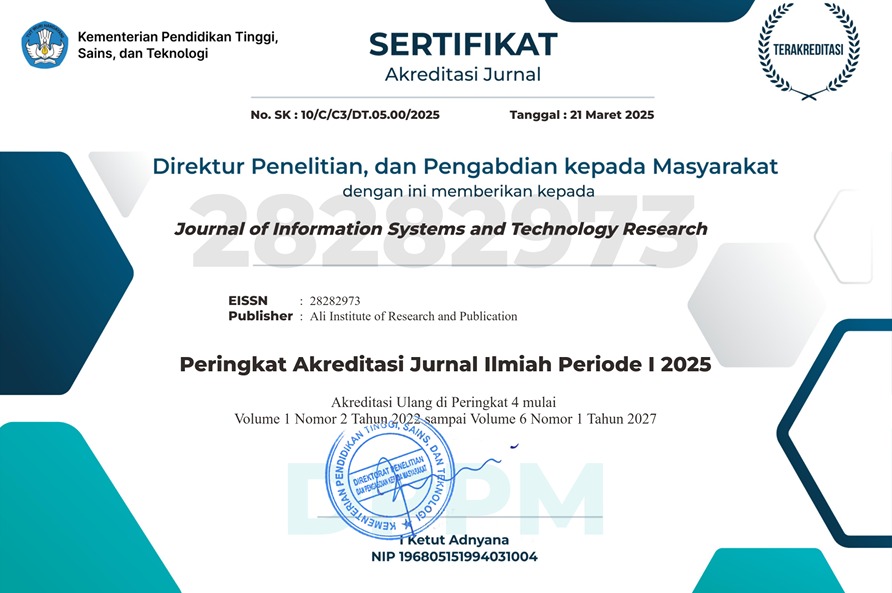Expert System To Diagnose Pregnancy Diseases In Women Using Naive Bayes Method
DOI:
https://doi.org/10.55537/jistr.v1i2.148Keywords:
Naive Bayes Method, Pregnancy Disease in Women, Expert SystemAbstract
Expert system is a system that uses human knowledge, where the knowledge is entered into a computer, and then used to solve problems that usually require human expertise or expertise. In this case the expert system is used to diagnose pregnancy diseases in women. Pregnancy disease is a condition in which there is a disturbance in pregnancy or the fetus in the womb. An expert system for diagnosing pregnancy diseases in women is an expert system designed as a tool for diagnosing types of pregnancy diseases. Computer programs are intended to provide aids in solving problems in certain areas of specialization such as pregnancy problems in women. This knowledge is obtained from various sources including books and the internet related to the causes of pregnancy in women. The knowledge base is structured in such a way as to become a database with several disease tables and symptom tables to facilitate system performance in drawing conclusions on this expert system using Naive Bayes. This expert system will display a choice of symptoms that can be selected by the user, where each symptom choice will read the user to the next symptom choice to get the final result.
Downloads
References
A. Rahmawati, R. Catur, L. Wulandari, U. Islam, and S. Agung, “Jurnal kebidanan,” vol. 9, pp. 148–152, 2019.
M. Christina and E. Sukartiningsih, “HUBUNGAN PENGETAHUAN IBU HAMIL TENTANG TANDA BAHAYA KEHAMILAN DENGAN KETERATURAN MELAKSANAKAN ANTENATAL CAREDI PUSKESMAS PEMBANTUDAUH PURI DENPASAR TAHUN 2014 Maria,” vol. 1, no. 1, pp. 2009–2010, 2014.
A. Ikhwan and N. Aslami, “Decision Support System Using Simple Multi-Attribute Rating Technique Method in Determining Eligibility of Assistance,” vol. 3, no. 4, pp. 604–609, 2022, doi: 10.47065/bits.v3i4.1370.
A. Ikhwan, S. B. Siagian, S. Mawaddah, M. Annisah, and S. Informasi, “Penerima Beras Raskin Dengan Metode Fuzzy,” vol. 9, no. 2, pp. 457–463, 2019.
K. Aji, J. T. Informasi, P. Studi, T. Informatika, and P. N. Malang, “Sistem Pakar Tes Kepribadian Menggunakan Metode Naive Bayes,” vol. 4, no. 2, pp. 75–78, 2019, doi: 10.31328/jointecs.v4i2.1010.
A. Ristekdikti, E. W. Ningsih, U. Bina, and S. Informatika, “Penerapan Algoritma Naïve Bayes Dalam Penentuan Kelayakan Penerima Kartu Jakarta Pintar Plus,” vol. VI, no. 1, 2020, doi: 10.31294/jtk.v4i2.
F. N. Putra, “Klasifikasi Tingkat Rumah Tangga Miskin Saat Pandemi Dengan Naïve Bayes Classifier,” vol. 7, no. November, pp. 165–173, 2021, doi: 10.34128/jsi.v7i2.339.
R. P. Sidiq, B. A. Dermawan, and Y. Umaidah, “Sentimen Analisis Komentar Toxic pada Grup Facebook Game Online Menggunakan Klasifikasi Naïve Bayes,” vol. 5, no. 3, pp. 356–363, 2020.
S. Shakya and S. Lamichhane, “Secured Crypto Stegano Data Hiding Using Least Significant Bit Substitution and Encryption,” J. Adv. Coll. Eng. Manag., vol. 2, p. 105, 2016, doi: 10.3126/jacem.v2i0.16103.
K. Sitorus and A. B. P, “Penentuan Bonus Tahunan Menggunakan Metode Simple Multi Attribute Rating Technique Graha Bumi Hijau memberikan bonus tahunan kepada tiap karyawannya , bonus ini dimanakan Key Performance Indicators ( KPI ). Dalam pemberian bonus ini memberikan kemampuan s,” vol. 16, pp. 20–27, 2022.
A. Ikhwan and N. Aslami, “Implementasi Data Mining untuk Manajemen Bantuan Sosial Menggunakan Algoritma K-Means,” JurTI (Jurnal Teknol. Informasi), vol. 4, no. 2, 2020, [Online]. Available: http://jurnal.una.ac.id/index.php/jurti/article/view/2103.
Additional Files
Published
How to Cite
Issue
Section
License
Copyright (c) 2022 Dini Syahfitri, Budi Serasi Ginting, Anton Sihombing

This work is licensed under a Creative Commons Attribution-ShareAlike 4.0 International License.







